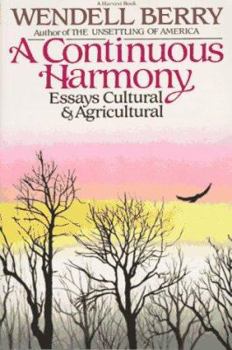A Continuous Harmony: Essays Cultural and Agricultural
Select Format
Select Condition 
Book Overview
This book is broad and leisurely and important. Something like the river itself on which Wendell Berry lives. It is full of wide and flowing thoughts and one thing leads to another in the manner that... This description may be from another edition of this product.
Format:Paperback
Language:English
ISBN:0156225751
ISBN13:9780156225755
Release Date:January 1979
Publisher:Houghton Mifflin Harcourt P
Length:182 Pages
Weight:0.45 lbs.
Dimensions:0.5" x 5.3" x 8.0"
Customer Reviews
2 ratings
Crucial Ideas for Environmentalists and Social Activists
Published by Thriftbooks.com User , 15 years ago
This book should be read by every person concerned with the state of the natural world and the place that Homo Sapiens occupies within it. I was particularly struck by Wendell Berry's discussion of mankind's relationship with "nature". Mr. Berry says "I begin, then, with the assumption that perhaps the greatest disaster of human history is one that happened to or within religion: that is the conceptual division between the holy and the world, the excerpting of the Creator from the creation." As he then explains, this leads to mankind's current attitude toward all life on Earth: "A man could aspire to heaven with his mind and his heart while destroying the earth, and his fellow men, with his hands." There are many other important ideas in this book, but to me, the necessity for an attitude of reverence for this world that we all live in is the linchpin of Mr. Berry's philosophy. I am also impressed with how prescient Mr. Berry was. This book was published in 1970, but his description of the movements of that era could easily be applied to today's struggles with environmental and social causes. In his famous essay "Think Little", Mr. Berry accurately dissects the various social justice movements of his time. "For it seems to me that the Civil Rights Movement and the Peace Movement, as popular causes in the electronic age, have partaken far too much of the nature of fads....As causes they have been undertaken too much in ignorance; they have been too much simplified; they have been powered too much by impatience and guilt of conscience and short-term enthusiasm, and too little by an authentic social vision and long-term conviction and deliberation." I strongly urge everyone who is concerned with the environment and other social justice issues to read this short gracefully written book (less than 200 pages) that is dense with cogent ideas for our times.
More Profound Insight from Berry
Published by Thriftbooks.com User , 23 years ago
In this small but important book (which describes most of Berry's collections), the great Jeffersonian essaysist takes on modernity and asks fundamental questions about the way we treat our land. Strip mining, reading and nature poetry are some of the subjects covered in this short collection. The most important essay, however, is Discipline and Hope, in which Berry argues that we must adjust our thinking about the planet and our interactions with it. Berry asks basic questions that point to many of the fundamental problems we confront today. How can we be truly free if we depend on others for almost everything of value -- food, clothing, shelter? Why do we surrender ourselves to specialists whose great achievements are usually abstract and aimed at making us dependent upon impersonal schemes? How can we live honorably if we do not honor our neighbors or creation by treating both with respect?Berry is trying to temper the fast-paced, profit obsessed society we have become by asking questions about the quality of our lives. Why do those who call themselves conservative fail to see the importance of conserving the health of our families, our land, our communities? Are they driven solely by profit and power? How is it that "compassionate" liberals pursue policies that would make us all dependent on government, thereby forcing us as a society to surrender our self reliance and our dignity? Are they concerned about us our their own power base? If we reduce all of life to commodities and measure all worth by what is of value in the short-term, we will surely continue to squander the most valuable parts of life and creation.Berry argues for a better way. Learn to be truly self reliant. Have the patience to do good work and honor the land on which you live. Care about your community as much as you care about your pocketbook. Grow your own food. Buy from local providers. Learn the wisdom of everyday farmers and craftsmen that has been forgotten and derided in recent decades. If this sounds quaint, well, think again. Our society was built in large measure by men and women who respected and understood nature. If we lose that part of our heritage, Berry argues, we risk not only losing our past, but also our future. Berry knows of that which he preaches -- he is a farmer as well as a writer and has spent decades studying the example of those who have not forgotten that America has always had a loyal opposition that sought to temper industrialization and commercial interests for the sake of the permanent things conservatives like Russell Kirk and T. S. Eliot once fought to preserve.





